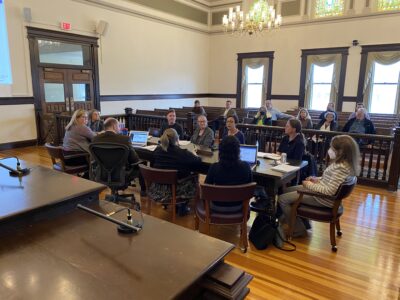County leaders are interested in using land for both solar energy and agriculture, but some worry about technical challenges

photo by: Austin Hornbostel/Journal-World
The Douglas County Commission was joined Wednesday by a panel that explained more about how agrivoltaics, the simultaneous use of land for solar energy and agriculture, could look in the county.
Douglas County leaders indicated Wednesday that they’d like to continue to consider how land in the county could be used for solar power generation and agriculture simultaneously, but they had some concerns about the technical challenges that could arise in such a system.
At a study session on Wednesday, the Douglas County Commission heard from a panel of guests who explained how that concept, called agrivoltaics, could be implemented in the area with proposed solar farm regulations that the commissioners will consider at a future meeting. Agrivoltaics can include land uses like growing crops, grazing livestock or planting pollinator plants.
Among those who spoke were Jacqueline Smith, the founder of Central Grazing Company, which raises lambs; and Amber Lehrman, the executive director of the Agrarian Future Alliance. Smith spoke about how sheep grazing could be viable in agrivoltaic projects, and Lehrman talked about how her organization trains farmers to take advantage of agrivoltaics. Both said the concept could help mitigate challenges like barriers to land access for beginning farmers or farmers from underrepresented groups.
However, commissioners had plenty of questions about the topic — especially regarding the technical challenges of multi-use land and how it could complicate leases and business arrangements among private land owners, solar corporations and agriculture businesses like grazers or planters. Commissioner Shannon Portillo said it was good to hear some more detailed examples of such land use, but that from a regulatory perspective it seemed like agrivoltaics could ultimately result in a more complex process.
Commissioner Shannon Reid said that though the technical challenges might be obvious, she was still on board with exploring how agrivoltaics could work on a potential solar farm in the county.
“I’m really interested in figuring out how we move this forward, and excited about the idea that we have an opportunity here, with all the players we have at this table, with all the expertise …” Reid said. “I think that we’ve got to keep the foot on the gas.”
The county’s interim sustainability director, Kim Criner Ritchie, was one of the panelists for the study session, and she said it was important to avoid approving any regulations intended for just one use. Instead, Criner Ritchie said, the county should be aiming to diversify land use in more than one sustainable way whenever possible.
That was echoed by another speaker — Byron Kominek, the owner of Jack’s Solar Garden in Boulder County, Colorado. Kominek said his solar farm is principally an energy provider, but the space under the solar array houses a fruit and vegetable garden and pollinator plants. It also serves as a learning tool and a space for events.
Kominek said he thought that if he could coordinate all of the technical elements of those uses on his own, the concerns of technical challenges from county leaders here were surmountable.
Allen Anderson, an attorney representing Florida-based energy firm NextEra, was also at the meeting and addressed some questions from commissioners. NextEra has expressed interest in developing a solar farm that would partially be located in Douglas County. Anderson said NextEra was interested in exploring and later implementing agrivoltaics, but that the firm was concerned because the concept didn’t exist at a larger scale yet.
Because the discussion was at a study session, county leaders didn’t take any action on the proposed solar regulations, but they could choose to add them to an agenda for consideration at a future meeting or direct county staff to look into agrivoltaics in greater depth.
In other business, the commission:
* Approved a one-year temporary business use permit for Dan C. King to allow the burning of trees, brush and other discarded vegetation hauled onto his property located at 1289 East 1750 Road. King will have to call dispatchers with area firefighting agencies whenever anything is burned on the property, and he must observe burn bans and avoid any burning while winds are directed at Kansas State Highway 10, which is near the property.







